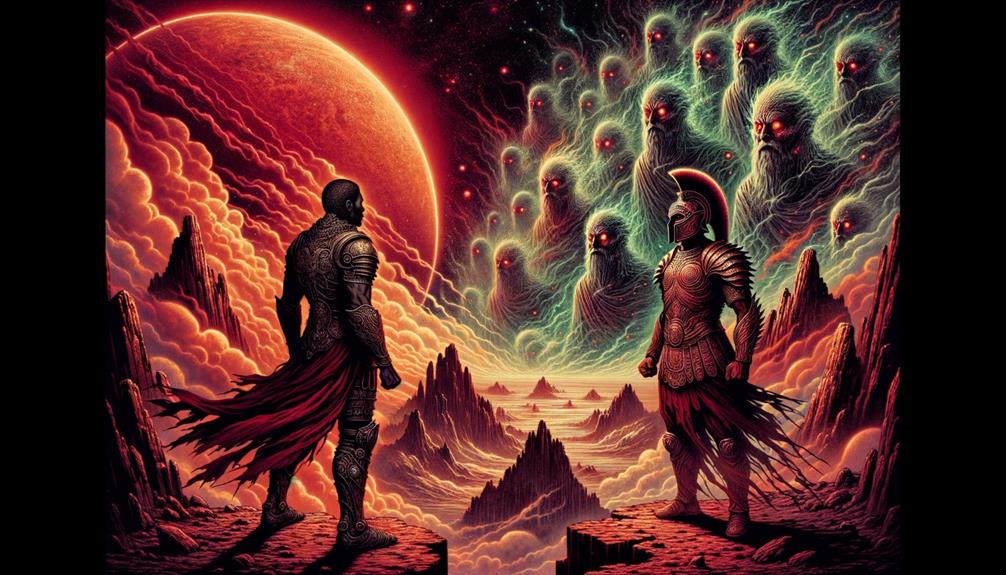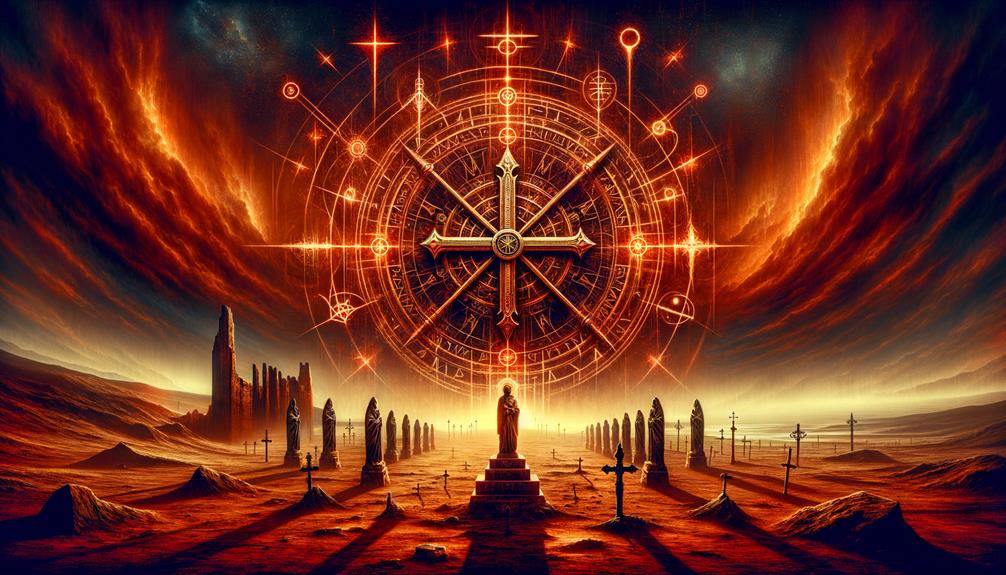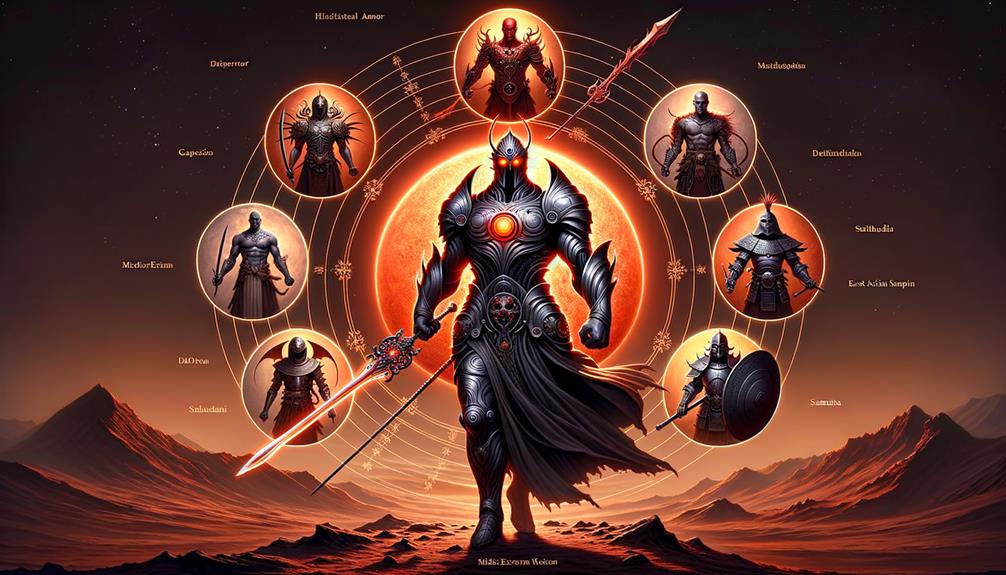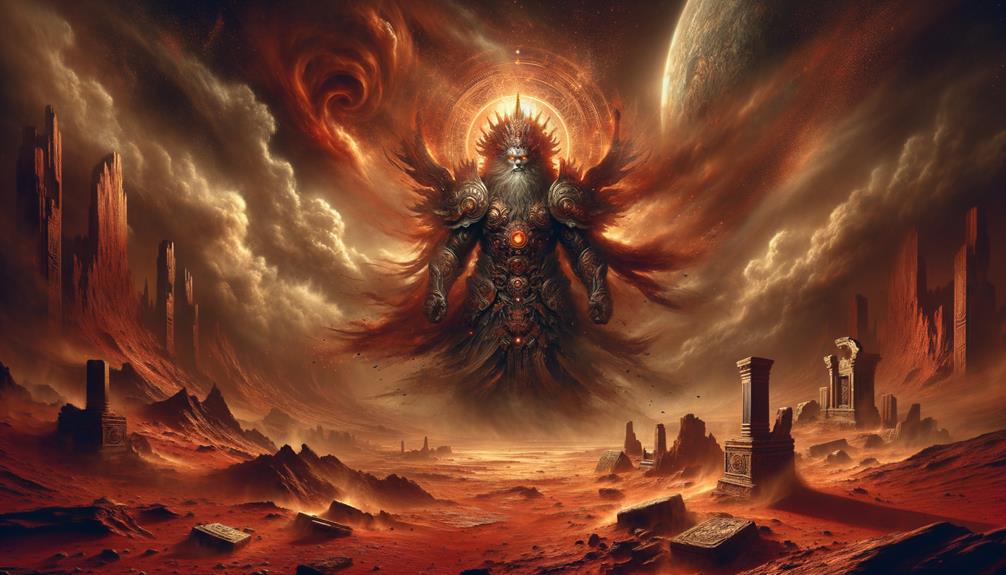Mars, the Roman war god, contrasts with his chaotic Greek counterpart Ares, embodying a more structured warrior spirit. As Jupiter and Juno's son, Mars wasn't solely about destruction; he signified the start of Rome's calendar year, tying warfare to agricultural cycles. His symbols – the spear, shield, wolf, and woodpecker – reveal his dual role as a fierce fighter and guardian. Understanding Mars's nuances offers insights into how Romans viewed war and protection.
These symbols influenced his festivals and rituals. The spear and shield represented Mars's military might, while the wolf symbolized the mythical founders of Rome, Romulus and Remus, nurtured by a she-wolf. The woodpecker, sacred to Mars, guided the twins to the site where Rome was founded. Annual festivals like Feriae Marti honored Mars, with rituals like carrying sacred shields and sacrificing animals. Such rites highlighted Mars's protective and agricultural associations alongside his warrior persona.
Birth and Origins
The formidable Roman god of war, Mars, emerged from the union of Jupiter and Juno, personifying themes of conflict and vitality. According to the poet Ovid's retelling, Mars' origins involve layers of divine scheming. Juno, seeking to conceive Mars independently from Jupiter, enlisted the goddess Flora's aid. Through Flora's intervention, Mars was born, symbolizing the creative force amid strife.
As the son of Jupiter, king of gods, and Juno, the queen, Mars' birth held significant weight in Roman mythology. The month of March, named after him, marked the start of the Roman calendar year, heralding renewal and preparation for the agricultural season. This duality of war and fertility underscores Mars' complex nature as a god governing both destruction and growth.
Mars' birth story touches on universal themes of power, creation, and divine meddling. His role in Roman mythology extends beyond mere conflict, encompassing the cyclical nature of life and death. The narrative of his birth, aided by Flora, sets the stage for understanding his multifaceted character that would shape countless legends and cultural practices.
Mars and Ares

Mars and Ares, gods of war in Roman and Greek mythology, offer an intriguing contrast in their representations of conflict. Mars embodies the strategic, orderly aspects of battle, often tied to defense and productivity in agriculture. In contrast, Ares depicts war's chaotic, bloodthirsty nature – raw, unrestrained violence.
To grasp the nuances between these deities, consider their archetypal roles:
| Aspect | Mars (Roman) | Ares (Greek) |
|---|---|---|
| Nature of War | Structured conflict | Chaotic, bloodthirsty |
| Prominence | Central in Roman myths | Less prominent in Greek myths |
| Additional Roles | Agriculture | None |
| Characterization | Defense, strategy | Destruction, aggression |
Mars represents a balanced archetype – a protector safeguarding Rome's prosperity. Ares symbolizes conflict's darker side, an embodiment of brutality and bloodlust. This dichotomy mirrors broader cultural values. Romans esteemed order and productivity, while Greeks viewed war as an unavoidable, yet unpredictable and destructive, evil. Through Mars and Ares, these ancient societies profoundly reflected their attitudes towards warfare's place within their mythologies.
Symbols of Mars

War's essence courses through Mars' symbols – the spear, shield, wolf, and woodpecker. In Roman art, the spear represents Mars' battle might and supremacy. More than just a weapon, it signifies his dominion over conflict, his unrelenting drive to overwhelm.
Complementing the spear, the shield reflects Mars' protective nature as a guardian deity. It's not mere armor but an emblem of safeguarding loyalties. This spear-shield duality balances aggression and defense, power and sanctuary.
As a fierce, untamed spirit, the wolf mirrors Mars' role as a protective divine guardian – loyal, savage when provoked. The woodpecker, Mars' sacred bird, ties him to the natural realm, resilient and enduring.
United, these symbols – spear, shield, wolf, woodpecker – narrate Mars' archetypal patterns. They weave tales of might, guardianship, and profound bonds to the earthly and celestial spheres in Roman mythology.
Epithets of Mars

Mars, the Roman god, was no one-dimensional divinity. Packed into his epithets lies a multifaceted character revealing varied roles and influences. Mars Ultor showcased his fierce protection and retaliatory vengeance for upholding justice and Rome's security. The paternal Mars Pater highlighted nurturing qualities impacting agriculture and the people's well-being.
On the battlefield stood Mars Gradivus, the unwavering warrior striding into combat with strategic resolve. And Mars Quirinus, the Spear God, connected to statehood and foundational Roman myths, symbolizing unity and strength.
These epithets conveyed Mars as not just a war god, but tied to agriculture, protection, and the fabric of Roman society. Understanding these layers sheds light on the profound reverence Romans held for this multidimensional deity across various domains.
Festivals and Rituals

In examining Mars's rituals and festivals, we explore a rich history intertwining martial and agricultural aspects of Roman life. These ceremonies highlight Mars's multifaceted role, blending war, protection, and fertility themes.
The Matronalia festival honors Juno, the childbirth goddess, on the first day of Mars's month, subtly acknowledging his protective influence over new life and families. This link reveals Mars's guardianship extending beyond battlefields to the home.
Central to Mars's worship were elaborate sacrificial rituals like the suovetaurilia, a triple offering of a bull, pig, and ram. This ritual embodied Mars's agricultural connection and dominion over war, bridging the fertility of the land with soldiers' vigor.
The military aspect shines at the Circus Flaminius, where a temple funded by war spoils stood, emphasizing Mars's military might. Contrasting this is the Temple of Mars Ultor, built as a vow during the Gallic siege, portraying Mars as both protector and avenger. These sacred spaces capture the duality of Mars's archetype, seamlessly blending war and guardianship.
Frequently Asked Questions
What God Is the God of Mars?
Mars, the war god in Roman mythology, embodied a fierce warrior spirit. As the son of Jupiter and Juno, he personified military power and shielding Rome from threats, deeply influencing the culture's martial traditions and reverence for valor.
Who Is the Wife of Mars?
Mars's wife is Nerio, personifying his power and manliness. Her name symbolizes masculine virtues, embodying archetypal themes of strength and unity. This coupling illustrates a widespread pattern where abstract qualities take human form and pair with deities.
Are Ares and Mars the Same?
Ares and Mars aren't carbon copies. Ares symbolizes chaotic warfare, while Mars represents strategic combat. Their contrasts highlight differing Greek and Roman values.
Who Is the God of War Like Mars?
Ares, the Greek god of war, embodied raw, chaotic aggression – a stark contrast to Mars' structured, protective nature. These two figures highlight archetypal themes surrounding conflict, power, and war's dual ability to both defend and destroy.


